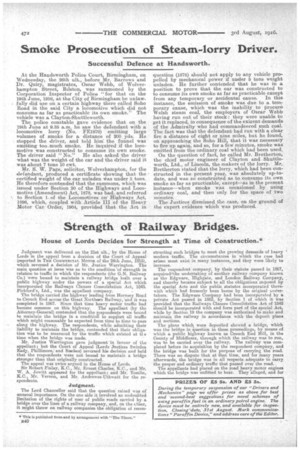Smoke Prosecution of Steam-lorry Driver.
Page 12

If you've noticed an error in this article please click here to report it so we can fix it.
Successful Defence at Handsworth.
At the Handsworth Police Court, Birmingham, on Wednesday, the 26th ult., before Mr. Barrows and Dr. Quiry, magistrates, Oscar Webb, of Wolverhampton Street, Bilston, was summoned by the Corporation Inspector of Police "for that on the 19th June, 1916, at the Cityof Birmingham he unlawfully did use on a certain highway there called Soho Road in the said City a locomotive which did not consume as far as practicable its own smoke.' The vehicle was a Clayton-Shuttleworth.
The police constable gave evidence that on the 19th June at 9.35 a.m. he saw the defendant with a locomotive lorry (No. FE1970) emitting large volumes of smoke for a distance of 200 yds. He stopped the driver, and told himthe funnel was emitting too.much smoke. Be inquired if the locomotive was constructed to consume its own smoke Thedriver said "No." He also asked the driver what was the weight of the car and the driver said it was about 7 tons, 10 cwt.
Mr. S. W. Page, solicitor, Wolverhampton, for the defendant, produced a certifieate showing that the certified weight of the car unladen ''as under 5 tons. He therefore contended that the summons, which was issued under Section 30 of the Highways and Locomotive (Amendment) Act, 1878, was bad, and referred to Section 1, of the Locomotives on Highways Act, 1896, which, coupled with Article III of the Heavy Motor Car Order, 1904, provided that the Act in question (1878) should not apply to any vehicle prepelled by mechanical power if under 5 tons weight unladen. He further contended that he was in a position to prove that the car was constructed to to consume its own smoke as far as practicable except from any temporary or accidental cause. In this instance, the emission of smoke was due to a, temporary cause, which was the inability to procure, Welsh steam coal, the employers of Oscar Webb having run out of their stock : they were unable to get it replaced, in consequence of the exigent demands of the Admiralty who had commandeered such coal. The fact was that the defendant had run with a clear fire a distance of eight or nine miles, but he found, on approaching the Soho Hill, that it was necessary to fire up again, and so, for a few minutes, smoke was emitted from the ordinary coal which had been used. On the question of fact, he called Mr. Brethertert, the chief motor engineer of Clayton and Shuttleworth, Ltd., of Lincoln, the makers of the lorry. Mr. Bretherton stated that the lorry, which had been constructed in the present year, was absolutely up-todate, and was. so constructed as to consume its own smoke as far as practicable, except—as in the present instance—when smoke was occasioned by using ordinary coal, and then only for the space of two minutes.
The Justices dismissed the case, on the ground of the expert evidence which was produced. .




















